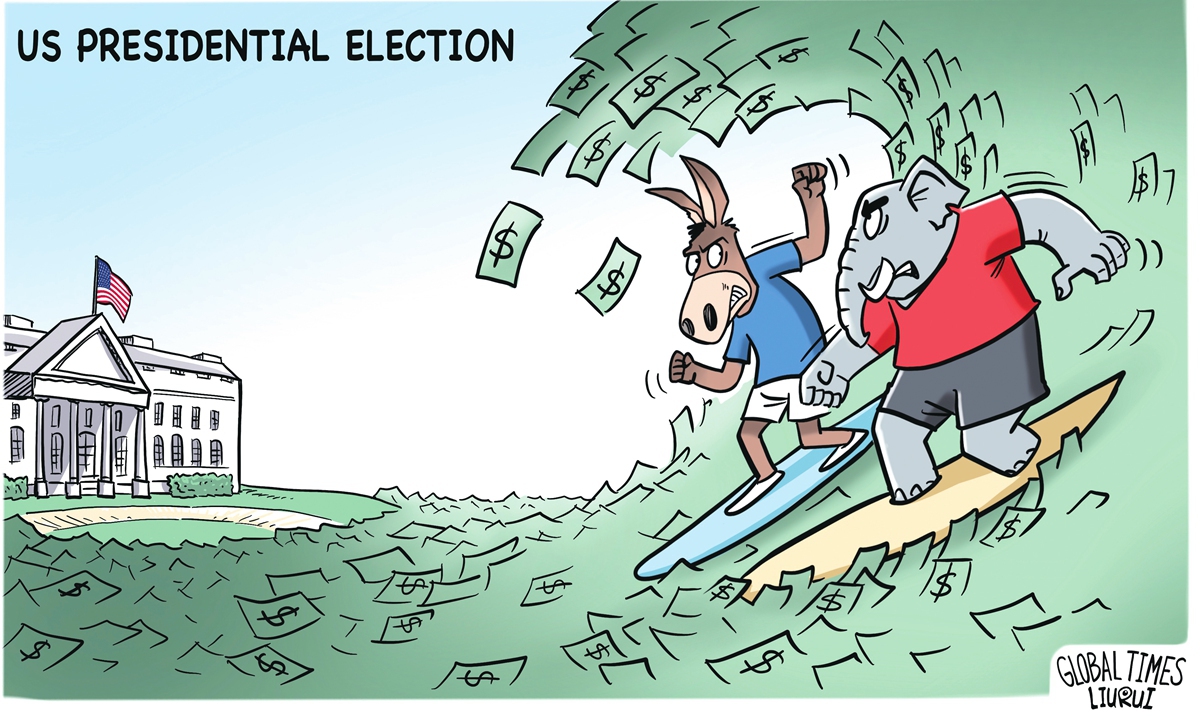
Illustration: Liu Rui/GT
The cellphones of American voters regularly buzz with text messages from political candidates telling the American people how much they care about them. Those texts often include a request to financially contribute to the campaign.
These messages, which no rational person would ever believe were actually written by the candidate, are one of the many reasons so many Americans are fed up with the political process in the country. It also explains why millions of Americans have abandoned the Democratic and Republican parties and opted to align with either a so-called third party or register as an independent.
Americans know full well that self-centered politicians communicate with the public only when they want something, such as money, their vote or to affirm their commitment to an anti-China stance.
By now, it is common knowledge that members of Congress typically spend around three days each week in Washington. For the remainder of the week, they are raising money, seeking to shake hands with prospective voters who might send a few bucks to support the next campaign. They are also attending fundraising events hosted by influential people from the political, entertainment and business worlds.
This is what the so-called system requires. Political action committees and special interest groups are ready to produce another candidate who is more liberal or conservative than a current representative, in case they do something that is considered wrong. Therefore, politicians become conformist in their thinking and understand that they must vote as the elites demand, or else.
For example, legislation or presidential announcements, too often relating to China, are supposed to protect national security but in fact, are a waste of tax dollars and serve no purpose at all.
Remember the China Initiative outlined by the administration under former president Donald Trump, which insisted it would ensure that scientific researchers and academics affiliated with China, especially those of Chinese descent, would not have access to sophisticated technologies? The initiative would make it easy to prosecute such scholars on flimsy charges. It eventually ended up in the trash can because it was a racist idea that did not align with American values.
Other anti-China examples can also fit here, and they all point to the same conclusion: The perception that a politician is tough on China can be good for fundraising. And we know politicians need to raise millions (billions if they want to become president) of dollars in order to keep their jobs.
When you recognize the dollars involved, it becomes clear why US politicians act as they do; they are part of a system in which their success or failure is predicated on pandering to their largest donors. America's private citizens have no chance to compete for such attention.
A recent poll conducted by the Pew Research Center offered a blunt conclusion: "Large shares of the public see political campaigns as too costly, elected officials as too responsive to donors and special interests, and members of Congress as unable or unwilling to separate their financial interests from their work as public servants." The poll found that 15 percent of respondents say that the biggest problem is greed or corruption among elected officials. It added that more than 60 percent say that all or most of the people who currently serve as elected officials ran for office to make a lot of money.
We mustn't forget that American exceptionalism is a myth, it always has been. How interesting it would be if American politicians would honestly and openly discuss how the country can continue to insist that it is a beacon of democracy around the globe when the electorate is disgusted by how campaigns are run. They should also be upset when flawed legislation is directed at one country.
Meanwhile, the public continues to be bombarded with automated text messages. And Americans are also disrupted by recorded phone calls as one politician after another asks for their vote.
The author is an associate professor at the Department of Communication and Organizational Leadership at Robert Morris University. opinion@globaltimes.com.cn




